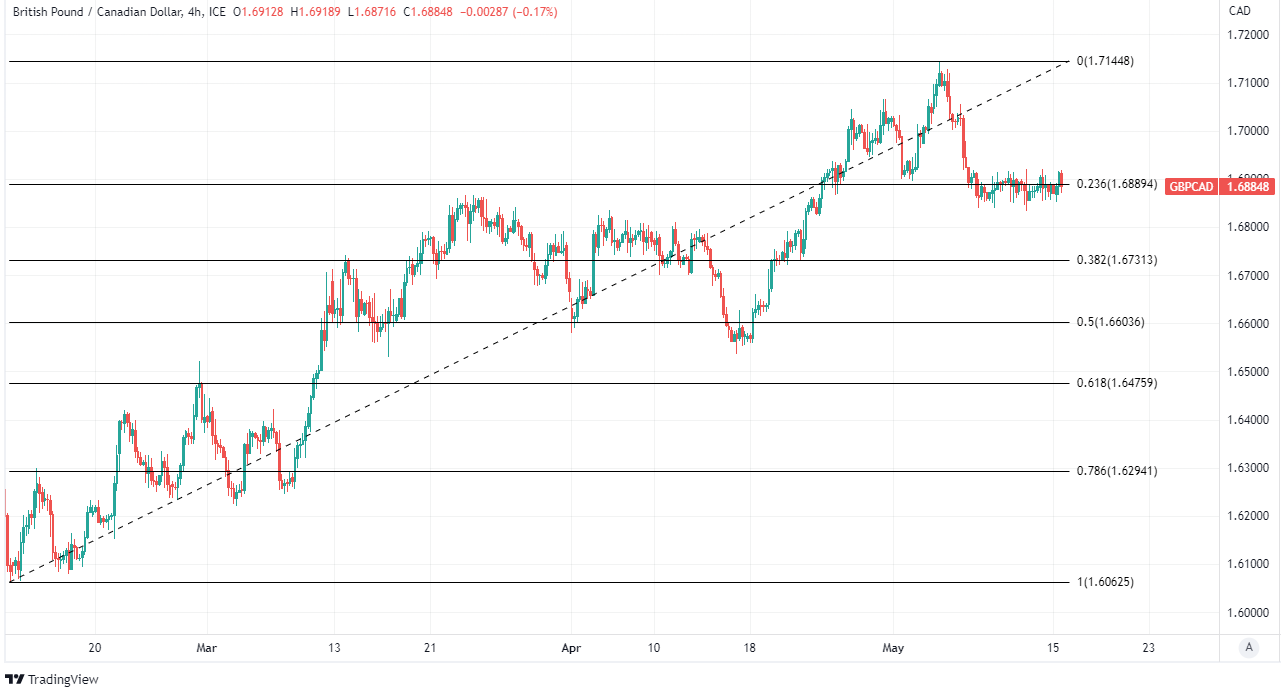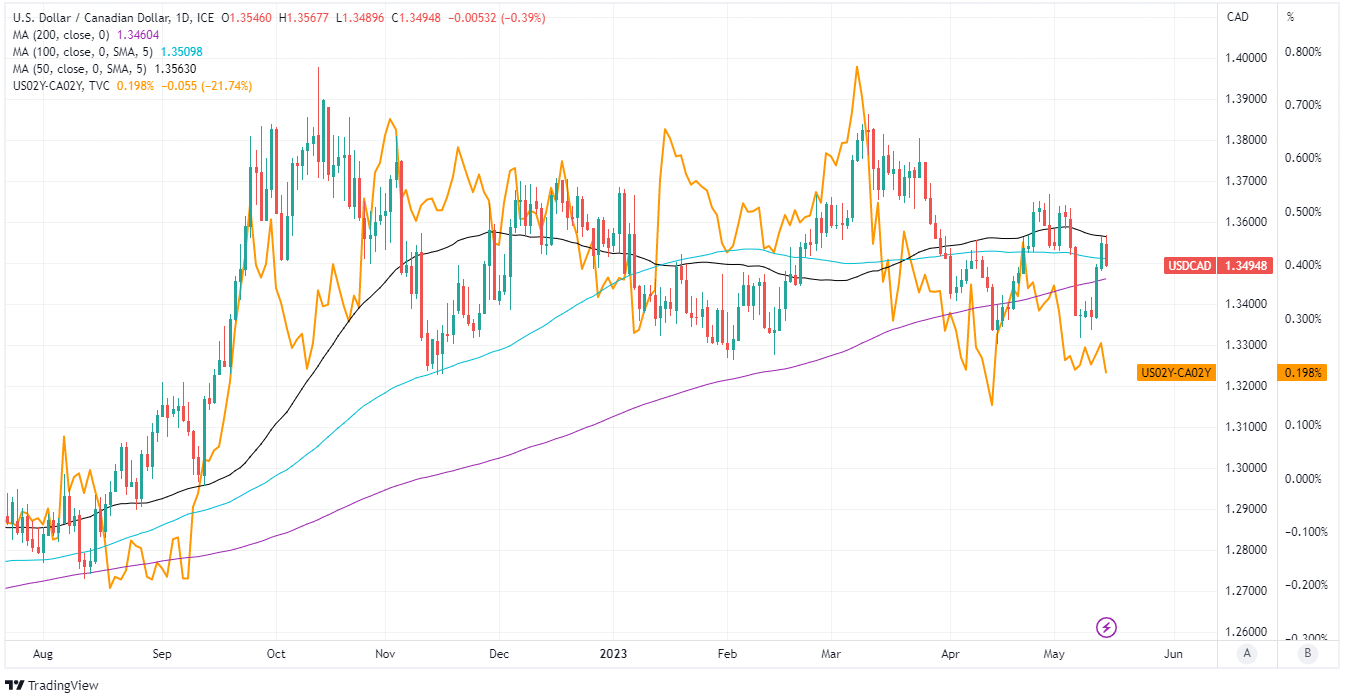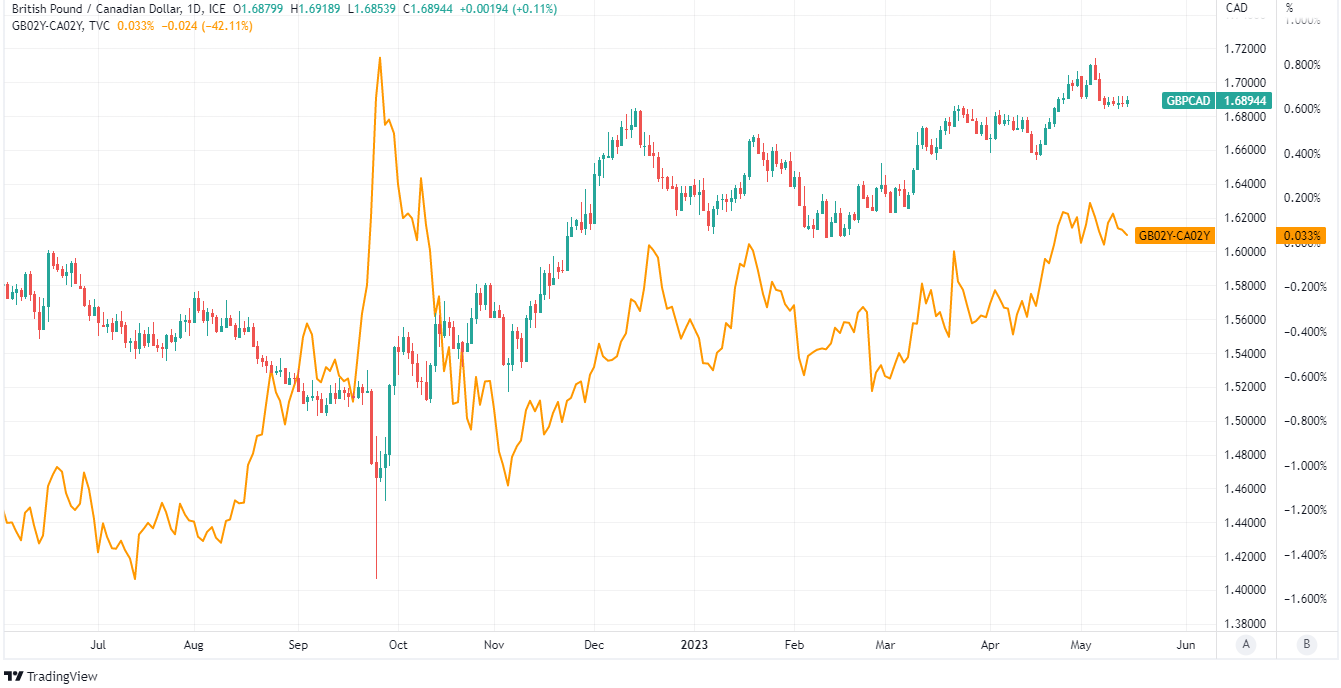GBP/CAD Week Ahead Forecast: Risk Tilts to the Downside
"The Bank of Canada is so far the only G10 central bank to explicitly pause its hiking cycle. But investors should be careful before assuming that this makes CAD an attractive short" - Goldman Sachs.

Image © Adobe Stock
The Pound to Canadian Dollar exchange rate entered the new week near its May low and with risk tilted to the downside going into the release of important economic figures in both the UK and Canada, which could potentially see GBP/CAD slipping back to or below 1.68 in the days ahead.
Canada's Dollar climbed against most of its G10 counterparts on Monday while outperforming a majority of the G20 grouping where the only currencies to advance more broadly were the South African Rand and Polish Zloty.
There was little obvious response from the Loonie when Statistics Canada announced a sharp increase in the number of new homes under construction in April and an improvement in business conditions for wholesalers but Tuesday's inflation figures could prompt some movement.
"The breadth of inflation pressures has narrowed. And early signs that the lagged impact of higher interest rates are weighing on economic growth suggest underlying inflation pressures should continue to ease," says Nathan Janzen, assistant chief economist at Royal Bank of Canada.
"The Bank of Canada is presently expected to sit on the sidelines for the remainder of 2023. Additional evidence of weaker price growth coupled with softening demand will affirm their present policy stance," Janzen writes in a Monday research briefing.
 Above: Pound to Canadian Dollar rate at 4- hourly intervals with Fibonacci retracements of February rally indicating possible areas of technical support for Sterling.
Above: Pound to Canadian Dollar rate at 4- hourly intervals with Fibonacci retracements of February rally indicating possible areas of technical support for Sterling.
Prices in interest rate markets have implied for months a high probability of the Bank of Canada (BoC) cutting its cash rate before year-end, and this in turn still suggests there is little, if any scope for expectations of borrowing costs to move lower in response to this week's data.
In other words, if Canadian inflation turns out weaker than economists expect, the Loonie would not necessarily fall much as a result.
Conversely, if inflation turns out stronger then the knock-on effect in interest rate markets could lead the Canadian Dollar to strengthen if it prompts an abandonment of the assumed interest rate cut for this year.
"The deceleration in inflation likely slowed in April, largely due to a modest monthly rebound in gasoline prices," says Avery Shenfeld, chief economist at CIBC Capital Markets, who forecasts the annual rate of inflation to fall to 4.1%.
"However, with prices at the pump slipping again to start May, and a large monthly increase dropping out of the annual calculation from a year ago, progress should quicken again next month," he adds in a Friday research briefing.
 Above: USDCAD shown at daily intervals with spread or gap between 02-year US and Canada government bond yields. Click image for closer inspection.
Above: USDCAD shown at daily intervals with spread or gap between 02-year US and Canada government bond yields. Click image for closer inspection.
All of this may mean the directional risk for the Canadian Dollar is skewed to the upside this Tuesday when economists will be looking on average to see the annual pace of inflation ticking lower from 4.3% to 4.1%.
The data will matter most in the context of the BoC's April assumption that inflation would fall to around 3% this summer following the significant increase in its cash rate implemented over the year to March, which saw the benchmark raised from 0.25% to 4.5%.
"The Bank of Canada is so far the only G10 central bank to explicitly pause its hiking cycle. But investors should be careful before assuming this makes CAD an attractive short," says Isabella Rosenberg, a strategist at Goldman Sachs.
"Since we see risks to the Fed’s baseline to pause (and the BoC’s on-hold stance) tilted to the upside, if things evolve as we expect, the market should eventually lift front-end yields in the US and Canada, supporting some CAD outperformance on crosses," she and colleagues write in a Friday research summary.
Anything leading to doubt about the BoC's summer forecast could weigh heavily on GBP/CAD in North American trade on Tuesday but before then the Pound might also be reactive to the latest UK employment and wage growth figures.
 Above: Pound to Canadian Dollar rate shown at daily intervals with spread or gap between 02-year UK and Canada government bond yields. Click image for closer inspection.
Above: Pound to Canadian Dollar rate shown at daily intervals with spread or gap between 02-year UK and Canada government bond yields. Click image for closer inspection.
Similarly but conversely to the Loonie, the Pound might be more sensitive to any weaker outcomes than it would to stronger outcomes in the UK on Tuesday.
This is due to financial markets already assigning a high probability to there being as many as two further increases in Bank Rate still to come this year.
Tuesday's wage figure is particularly important after the Bank of England (BoE) said last Thursday that "tightness of labour market conditions and the behaviour of wage growth and services price inflation," will decide future policy.
The BoE raised Bank Rate to 4.5% last week, bringing it into line with the BoC cash rate, and sharply upgraded all of its forecasts for the economy.
"The UK central bank has moved off its prior forecast for an outright recession, but that’s based on what could have been a very short-lived dose of better news," CIBC's Shenfeld says, "Our GDP forecasts for the UK and the eurozone are in fact more pessimistic than our calls for the US or Canada."
